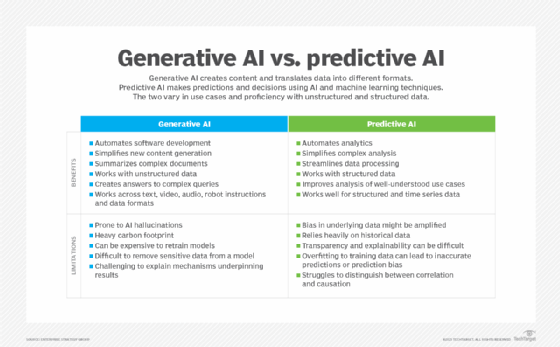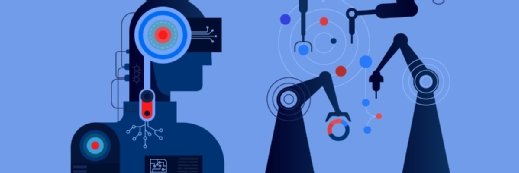How AI is shaping the future of ERP
Generative AI and other machine learning tools are being added to ERP at a rapid pace, bringing new levels of automation and efficiency to business processes across the enterprise.
The enthusiasm for ChatGPT and other generative AI tools has sparked a surge of interest in how AI can be used across every aspect of the business, including ERP. All the major ERP vendors have been quickly developing a wide range of AI assistants, chatbots and copilots to simplify and democratize interactions with their increasingly complex applications.
Much of the recent hype has been inspired by generative AI's increasing proficiency in searching through and summarizing complex data, including unstructured data, in documents pulled from across the enterprise. At the same time, this enthusiasm has renewed interest in more traditional approaches, especially machine-learning AI for improving predictions, automating decisions and streamlining workflows that span multiple applications, employees and partners.
How is AI being integrated into ERP?
All the major ERP vendors are directly integrating new AI capabilities into their enterprise applications, such as the following:
- SAP has developed industry-specific AI tools and introduced the Joule AI copilot to democratize access to SAP business systems.
- Microsoft has been adding a wide range of AI capabilities and virtual agents into Dynamics 365 that are designed to streamline sales, enhance customer insights, optimize supply chains and reduce fraud.
- Oracle has launched Oracle AI Apps for ERP in addition to new Oracle generative AI capabilities, intending to make it easier to embed new capabilities across a breadth of Oracle cloud and industry applications.
"Currently, companies are adding AI into existing ways of using applications, which makes it easier to use and configure ERPs," said Rich Sernyak, U.S. SAP practice leader at PwC. "But the real power of this will come when entire workflows are created using generative AI, transforming how work is done rather than just making a task easier."
Take invoice processing, a workflow that involves numerous queues with many people reading, integrating and moving data into ERP systems. With generative AI, the process can be flipped so that AI does all the tedious and repetitive work in advance. People can then focus more on validating the data rather than reading, assessing, integrating and transcribing it.

Common use cases
Bret Greenstein, partner and generative AI leader at PwC, is particularly excited about the efficiencies that new generative AI capabilities bring to ERP. For example, AI can make it easier for users to retrieve and assess data from the ERP using natural language queries. Additionally, generative AI can make configuring and customizing ERP systems easier based on an enterprise's unique needs. Other applications of AI are intended to make existing ERP functions more streamlined and easier to work with.
Additionally, new AI-powered tools for process mining analyze logs from across ERP systems to derive insights needed to address net-zero and sustainability goals. For example, data related to carbon emissions, including Scope 3 emissions of third-party suppliers, may be buried in ERP systems, spreadsheets, supply chain management applications and other siloed systems. AI can automate the process of aggregating such data and help enterprises meet ESG goals faster and more cost effectively.
Here are some other common AI use cases:
- Predictive analytics can predict future outcomes and help users make better decisions proactively.
- Data transformation and integration efforts can use AI to help teams work with larger data sets, and more types of data, to optimize schedules more efficiently.
- Intelligent process automation can drive efficiencies across more types of processes than possible with more brittle approaches, such as robotic process automation.
- Automated summarization can distill insights from complex documents and collections of documents for different roles, goals and levels of expertise.
- Anomaly detection algorithms can quickly identify and help fix problems or issues and reduce costs.
- Recommendation engines can suggest partners, product offerings and next steps in a business strategy.
- Financial reporting and forecasting can use AI to pull relevant data from various ERP systems, documents and spreadsheets to streamline various aspects of financial analysis.
- Predictive maintenance algorithms can analyze data about machine health, schedules, parts inventory and process dependencies to optimize maintenance and repair efforts.
Key business benefits of AI in ERP
AI in ERP can boost speed, scale and skills, according to Sernyak. "Generative AI makes it easier to interface with development tools and data using natural language by helping people work more efficiently and elevate the skills of less experienced people," he said.
At the same time, it's important to appreciate that all AI systems are driven by statistical processes, which have their limits. In the most extreme cases, this has given rise to the realization that generative AI tools have a propensity for AI hallucinations, resulting in false or misleading data or suggestions. But other forms of AI can suffer related problems.
Greenstein said there is always a requirement for skilled people to assess the quality of output from generative AI, but recent innovations can help make those who support these efforts much more productive.
Michelle Cipollone, vice president of product at Deltek, which makes a project management platform, said AI can also do the following:
- Improve data processing and analytics by recognizing context and generating valuable predictions and insights to help businesses make better decisions and optimize their performance.
- Enhance the customer experience by providing a deeper understanding of customer needs and preferences, offering personalized recommendations and support, and ultimately increasing customer satisfaction and loyalty.
- Automate and improve various business processes, such as purchase decisions, resource planning, human capital management, marketing and customer service, using smart algorithms, chatbots, digital assistants, voice recognition and other features.
- Enable innovation and transformation by creating new opportunities, products and services and by helping businesses adapt to changing market conditions and customer expectations.
The future of AI in ERP
Sernyak predicts ERP systems will likely continue to incorporate more native AI capabilities. "Rather than simply making it easier to do things in the current workflow, entire workflows will be handled by AI on behalf of the user," he said.
However, getting the most value from the AI in ERP won't necessarily be easy or straightforward. For one thing, AI will require more collaboration and coordination among ERP stakeholders, such as vendors, customers, partners and regulators, Cipollone said.
AI also raises ethical, legal and social issues that will need to be addressed, such as data privacy, security, accountability and transparency. It is also creating new challenges and opportunities in skills development, training and education, as well as in organizational culture and change management.
Underneath all of this will be a renewed focus on organizing data and processes to take advantage of AI. John Collins, change leadership and transformation lead at Easology, a vendor of software for mobile devices, said many of the teams he has worked with started down the path of AI automation only to discover poor processes that needed to be addressed first.
Integrating AI into a process can be an opportunity to generally improve, but this takes time, subject matter experts and a willingness to embrace new approaches, Collins said.
"Get ready to have lots of conversations about access and process controls, especially if this is impacting financial reporting or access to private data," he said. Such challenges aren't insurmountable but can take a lot more time than people expect, especially if AI auditing is involved.
George Lawton is a journalist based in London. Over the last 30 years he has written more than 3,000 stories about computers, communications, knowledge management, business, health and other areas that interest him.







